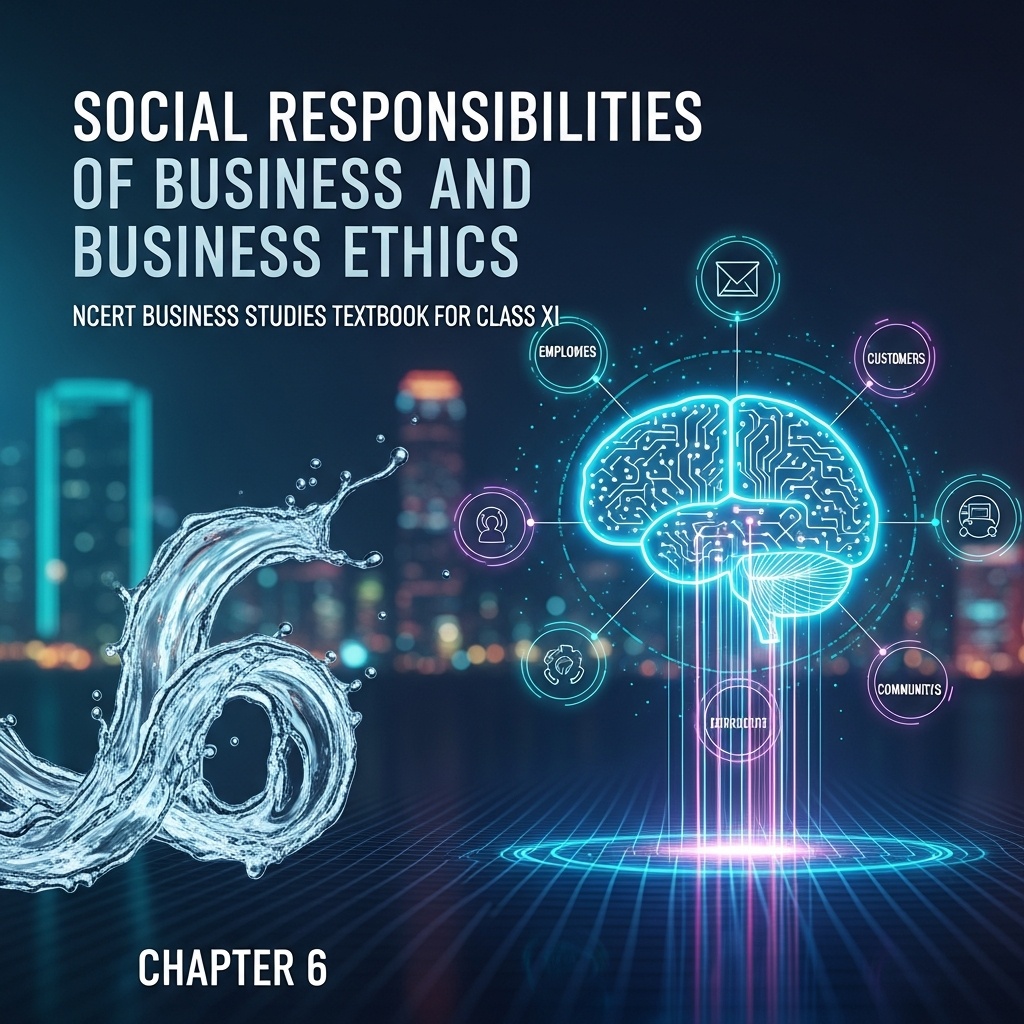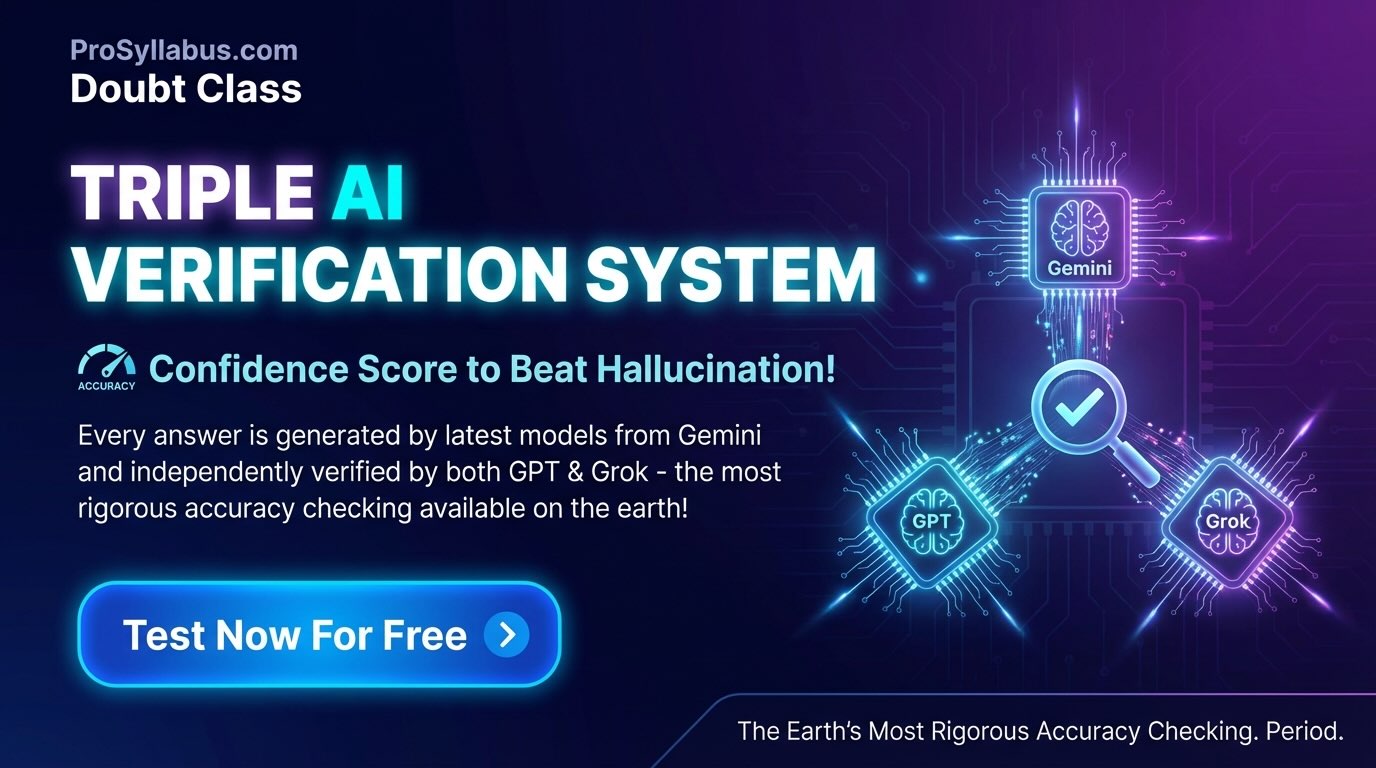Complete Summary and Solutions for Business, Trade and Commerce – NCERT Class XI Business Studies, Chapter 6 – Explanation, Questions, Answers
Detailed summary and explanation of Chapter 6 'Business, Trade and Commerce' from the Class XI Business Studies textbook, covering the concept and types of trade, evolving modes of business, international trade, recent trends in e-commerce and digital trade, and the role of technological innovations like e-banking and digital payments, along with all NCERT questions, answers, exercises, and project work.
Updated: 2 months ago
Categories: NCERT, Class XI, Business Studies, Chapter 6, Business, Trade, Commerce, E-commerce, Digital Payments, Summary, Questions, Answers, Explanation

Social Responsibilities of Business and Business Ethics
Chapter 6: Business Studies - Ultimate Study Guide | NCERT Class 11 Notes, Questions, Examples & Quiz 2025
Full Chapter Summary & Detailed Notes - Social Responsibilities of Business and Business Ethics Class 11 NCERT
Overview & Key Concepts
- Chapter Goal: Understand social responsibility (SR) concept, need, kinds, towards groups, business-environment link, ethics. Exam Focus: Arguments for/against, 4 kinds, 5 groups, ethics elements; 2025 Updates: CSR under Companies Act 2013 (2% spend), sustainability in post-pandemic firms (e.g., ethical supply chains). Fun Fact: Mani's shift from cynicism to belief via Mr. Raman's interview. Core Idea: Business as societal organ – profit with ethics. Real-World: Truck firm's fair dealings. Expanded: All subtopics point-wise with evidence (e.g., adulteration harms), examples (e.g., pollution control), debates (profit vs. society).
- Wider Scope: From intro to ethics; sources: Cases (Mani/Raman), CSR definitions (EU/WBCSD), India Act; tables on arguments/kinds.
- Expanded Content: Include modern aspects like ESG, voluntary CSR; point-wise for recall; add 2025 relevance like green ethics.
Introduction & Concept of SR
- Case: Mani (reporter on malpractices) interviews Mr. Raman (ethical truck firm) – shifts view on profitable ethics.
- Concept: Obligation for desirable decisions/actions per societal values; broader than legal (voluntary element). Contrast: Profit-only vs. public good.
- Examples: Undesirable (adulteration, pollution) vs. desirable (quality goods, taxes, complaints).
- CSR Box: EU: Impacts on society; WBCSD: Economic dev + life quality; India: Clause 135 (2% net profit for Rs.500cr+ firms, Schedule VII activities).
- Expanded: Evidence: Ethical firms durable success; debates: Voluntary vs. mandatory; real: Post-2020 ethical labor.
Conceptual Diagram: SR Pyramid
Base: Economic/Legal; Middle: Ethical; Top: Discretionary (voluntary). Arrows show voluntary ascent; ties to profit-society balance.
Why This Guide Stands Out
Comprehensive: All subtopics point-wise, case integrations; 2025 with ESG ethics (e.g., green CSR), arguments analyzed for debates.
Need for SR: Arguments For/Against & Reality
- For (8 Arguments): (i) Existence/growth via service; (ii) Long-term interest/image; (iii) Avoid regulation; (iv) Society maintenance; (v) Resources (talent/capital); (vi) Problems to opportunities; (vii) Better business env; (viii) Responsible for problems (pollution/corruption).
- Against (4 Arguments): (i) Violates profit max; (ii) Consumer burden (higher prices); (iii) Lack skills; (iv) No public support.
- Reality: Shift to obligations; factors: (i) Regulation threat; (ii) Labor pressure; (iii) Consumer consciousness; (iv) Social standards; (v) Education; (vi) Interest harmony; (vii) Professional managers.
- Method Matching: For links to cases (Raman's image); reality to India Act.
- Expanded: Evidence: Tata CSR; debates: Profit vs. ethics; real: 2025 ESG mandates.
Kinds of SR (4 Categories)
- (a) Economic: Produce/sell goods profitably (little discretion).
- (b) Legal: Law compliance (societal good).
- (c) Ethical: Expected but uncodified (e.g., respect sentiments; voluntary).
- (d) Discretionary: Pure voluntary (e.g., charity, disaster aid).
- Key Insight: Progressive from mandatory to voluntary.
- Expanded: Evidence: Pollution devices (ethical); real: CSR committees (discretionary).
Exam Case Studies
Mani's malpractices vs. Raman's ethics; CSR in India Act.
SR Towards Interest Groups (5 Key)
- (i) Shareholders/Owners: Fair return/safety on investment.
- (ii) Employees: Fair wages, healthy conditions, training (inferred from text).
- (iii) Consumers: Quality goods, fair prices, info (inferred).
- (iv) Government: Taxes, rules compliance (inferred).
- (v) Community: Environment protection, welfare (inferred).
- Interrelation: Multi-stakeholder balance.
- Expanded: Evidence: Raman's fair dealings; real: 2025 stakeholder capitalism.
Business & Environment
- Relationship: Business causes pollution/depletion; responsibility to conserve (e.g., devices, green practices).
- Need: Sustainable dev; avoid anti-social acts.
- Expanded: Evidence: Factory pollution; debates: Cost vs. benefit; real: ISO 14001.
Business Ethics: Concept & Elements
- Concept: Moral principles guiding business (right/wrong).
- Elements: Top commitment, publication, ethics officer, fair HR, animal welfare, environment, competition, health/safety, transparency, community (inferred standard).
- Key Themes & Tips: Voluntary uprightness. Tip: Link to SR kinds.
Project & Group Ideas
- Group debate: For/against SR; individual CSR report.
- Ethical role-play: Malpractice scenarios.
- Analyze Raman case for ethics.

Group Discussions
No forum posts available.


